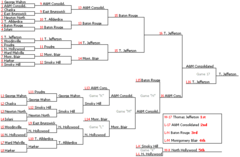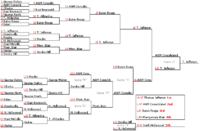A bracket or tournament bracket is a tree diagram that represents the series of games played during a knockout tournament. Different knockout tournament formats have different brackets; the simplest and most common is that of the single-elimination tournament. The name "bracket" is American English, derived from the resemblance of the the links in the tree diagram to the bracket punctuation symbol ] or [ (called a "square bracket" in British English). The closest British term is draw, although this implies an element of chance, whereas some brackets are determined entirely by seeding.
In some tournaments, the full bracket is determined before the first match. In such cases, fans may enjoy trying to predict the winners of the initial round and of the consequent later matchups. This is called "bracketology", particularly in relation to the NCAA Men's Division I Basketball Championship. This prediction is not possible in tournaments, such as the FA Cup and the UEFA Champions League, in which the pairings for a later round are not made until after the previous round has been played.
Usage in North America

Brackets are commonly found in major North American professional sports leagues and in U.S. college sports. Often, at the end of the regular season, the league holds a post-season tournament (most commonly called a playoff) to determine which team is the best out of all of the other teams in the league. This is done because often in American professional sports there are at least two different conferences, and teams mostly play other teams in their own conference. Examples of this are the American Football Conference and the National Football Conference in the NFL, the American League and the National League in Major League Baseball, and the Eastern Conference and the Western Conference in the NBA or NHL.
When there are only two different conferences, there are two sides of the bracket. One conference is on one side, while the other is on the opposite side. Each side is organized according to a team's seeding; higher-seeded teams are matched against lower-seeded teams. Teams that qualify for the post-season tournament only compete against teams in their own conference, until only one team from each conference remains. These two teams, called the conference champions, play each other to determine the best in the league. Other leagues, like the NHL, have two conferences, each of which is divided into divisions, usually by region. In the post-season tournament, only the teams with the best records qualify, with the exception of the division leader having an automatic entry into the tournament.
Most North American professional post-season tournaments are single-elimination format. If a bye is required, the top seeded teams usually get the bye. There is usually no third place match to separate the third and fourth place teams.
The concept is even more visible in college sports, most notably in reference to the NCAA Men's Division I Basketball Championship, in which millions of casual and serious fans "fill out brackets"â€"predict the winners of each game in the tournamentâ€"in both formal contests, sponsored by various corporations, and informal betting pools among friends or work colleagues. The brackets are much larger than those in North American professional leaguesâ€"while no more than 16 teams qualify for the postseason in any major North American league (this is the case in the NBA and NHL), 68 teams (out of over 350) advance to the NCAA men's tournament, with most bracket contests involving 64 of these teams.
Examples

The diagrams for formats other than single-elimination are more complex than a simple tree.


Posting Komentar